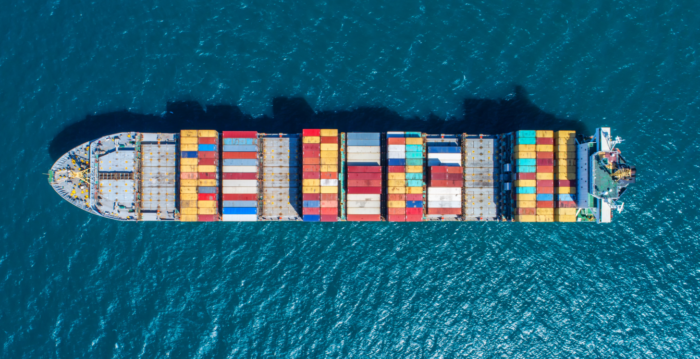While several landmark agreements have been put into force over the years to minimize the impact of shipping activity to the natural environment, the vast presence of shipping makes some of these impacts hard to eliminate. Shipping traffic has increased 300% in the past two decades, with some of the world’s busiest shipping routes overlapping with marine life habitats, according to WWF. What does this mean for marine ecosystems?
#1 Ship strikes
Ship strikes are among the main causes of death for endangered whale populations, according to WWF. Last September, a photo of a 10-meter-long dead whale stuck on the bulbous bow of a tanker circulated around social media when the ship berthed at Mizushima port, in north Japan. According to local media reports, the ship struck the 5-tonnes male Bryde whale at the middle of its body and was dragging it during the rest of its journey through the Pacific without the crew realizing it.
[smlsubform prepend=”GET THE SAFETY4SEA IN YOUR INBOX!” showname=false emailtxt=”” emailholder=”Enter your email address” showsubmit=true submittxt=”Submit” jsthanks=false thankyou=”Thank you for subscribing to our mailing list”]
In addition, a shocking photo taken by underwater photographer Francis Pérez and published by the US-based NGO Great Whale Conservancy depicts a sperm whale having its tail cut off by a ship’s propeller. The number of whales killed by ships are about 1,000 every year, Michael Fishbach from the NGO the told Business Insider.
As, in most cases, the dead whale ends up to the bottom of the ocean, estimations and proper monitoring of the issue are hard. The International Whaling Commission says that evidence comes only from direct reports from the vessel involved, and examination of dead whales found floating at sea or washed up on the beach. Most reported collisions with ships and boats involve large whales, seals, or sea lions, according to US NOAA. Endangered North Atlantic right whales are especially vulnerable to vessel strikes because their natural habitat is the busy waters off the east coast of the US and Canada.
#2 Underwater noise
Marine animals rely on sound to communicate underwater and understand information about their environment, as well as for mating, catching prey, and territory defense, thus for surviving. Shipping produces sounds that not only interfere with the ability of marine species to hear natural sounds, but also resulting in hearing loss, displacement, increased stressed levels, changed behaviors, and even death. In a bid to address the issue, the IMO SDC 8 last January began its work to review the 2014 Guidelines for the reduction of underwater noise from commercial shipping.
#3 Plastics pollution
Despite the MARPOL ban of discharging plastic litter at sea, the environmental impact of shipping on marine environment still includes discharge of garbage, i.e., from shipbuilding and ship recycling activities or from shipping accidents. Lost containers are also an alarming issue on their own, with Statista figures revealing 391 occurrences of shipping containers lost at sea in 2019 in Europe alone and Bloomberg data showing 1,000 containers lost at sea globally in the first three months of 2021 alone.
The most visible impacts of plastic debris are the ingestion, suffocation and entanglement of marine species that mistake plastic waste for prey; most then die of starvation as their stomachs become filled with plastic. They also suffer from lacerations, infections, reduced ability to swim, and internal injuries. Floating plastics also help transport invasive marine species, thereby threatening marine biodiversity and the food web, according to IUCN. Through the food web, plastics can also affect human health. Regulatory framework led by MARPOL, which bans ships from dumping plastic at sea, as well as the London Convention and the London Protocol are great steps, but plastic pollution is still growing dramatically.
#4 Oil spills
According to EU data, large accidental oil spills from shipping account for about 10-15% of all oil that enters the ocean worldwide every year. Oil spills are most often caused by accidents involving tankers, barges, pipelines, refineries, drilling rigs and storage facilities, NOAA data shows, and can significantly affect marine ecosystems.
The consistency of oil can cause surface contamination and smothering of marine biota. Many birds and animals swallow oil and are poisoned when they try to clean themselves or when eating oiled prey. Fish and shellfish can also digest oil, which could cause changes in reproduction, growth rates or even death. For example, studies to striped dolphins on the aftermath of Deepwater Horizon oil spill revealed severe health and reproductive issues.
Top 3 largest oil spills from ships in Europe
- Amoco Cadiz, 1978, off Brittany, France
- Haven, 1991, off Genoa, Italy
- Torrey Canyon, 1967, off UK
#5 Ballast water
Despite being essential for stabilizing vessels at sea, ships’ ballast water is one of the main causes of transfer of invasive aquatic species -such as bacteria, microbes, small invertebrates, eggs, cysts and larvae of various species- from the world’s one region to the other. The issue is globally recognized as one of the greatest threats to the ecological and economic wellbeing of the planet for causing enormous damage to biodiversity.
The transferred species may survive to establish a reproductive population in the host environment, becoming invasive, out-competing native species and multiplying into pest proportions. IMO data show that the rate of bio-invasions is continuing to increase at an alarming rate and new areas are being invaded all the time. On the economic front, the impact of invasive species is also considerable. In Canada alone, it is estimated that invasive species cause around $6 billion in disruption and damages every year, according to ClearSeas. To address the issue, the IMO’s BWM Convention, requiring ships to manage their ballast water, entered into force in 2017.






























































